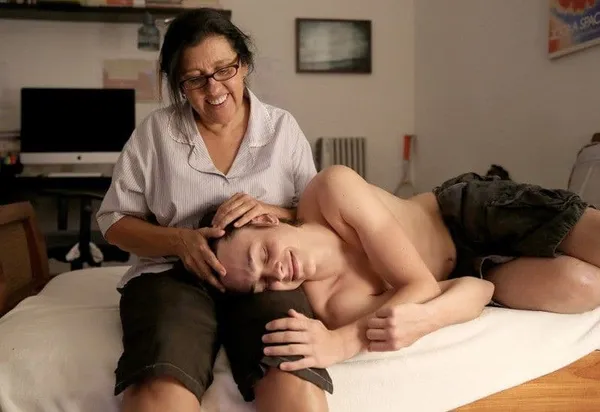Eye For Film >> Movies >> The Second Mother (2015) Film Review
The Second Mother
Reviewed by: Amber Wilkinson

The idea of a maid's story brings with it notions of drudgery and gritty social realism, but while Anya Muylaert's engaging drama doesn't shy away from the realities of life as a home help in Brazil, she also concentrates on the upbeat humanity of those involved and suggests that change may be coming with the next generation.
The Portugese title translates as "What time will she be back?" and carries a double meaning for two of the main female protagonists. In the case of Val (Regina Casé), it's a question her daughter can surely have no answer to, given that her mum moved to São Paulo many years ago to work, leaving her in the care of others. Fabinho (played as a teenager by Michel Joelsas) also asks the question near the start of the film, as his high-flying mother Barbara (Karine Teles) works late at the office, leaving Val as her surrogate. Val is simultaneously part of the family - the one Fabinho goes to in the night when he has problems - and an outsider relegated to the smallest room in the house. The relationship with Fabinho is reciprocal, she offers him the first port of call for comfort but he in turn offers somewhere for her to pour her love and attention in the absence of her own child.

But when Val receives word from her now teenage daughter Jéssica that she is heading to the city in hopes of studying architecture, the scene is set for a clash of emotions and values. Jéssica (Camila Márdila) doesn't have the ingrained subservience of Val when it comes to the household. After one night on a mattress in her mother's cramped quarters, she angles her way into the guest bedroom and thinks nothing of eating along with her mother's employers, viewing herself as an equal. Val struggles to cope, both with the semi-stranger back in her life and, particularly, her Jéssica's forthright attitude, gradually coming to embrace change herself.
Muylaert gently probes at ideas of class, showing how the largely ineffectual father of the house Carlos (Lourenço Mutarelli) may pretend to be 'right on' but who secretly hopes the power he holds over Val will extend to her daughter. Fabinho, on the other hand, views Jéssica on much more equal terms. Muylaert refuses to demonise the family, showing how in some ways they are just as much victims of the system, with Barbara having to face the fact that Val is crucial to Fabinho's sense of self. The director explores snobbery through humour, showing Val presenting a modern black and white coffee set to Barbara for her birthday - which may not be expensive to the household but which was certainly not a cheap option for the maid - only for her later to be shooed back into the kitchen with it when she tries to use it with guests. The sight of Val attempting to make all the cups, saucers and pot fit on the special tray in the way it is supposed to according to the picture on the box, is both laugh out loud funny and a metaphor for the ridiculousness of trying to maintain social order in a changing society.
These sorts of clever symbols abound - from Fabinho's favourite ice-cream to a swimming pool declared 'out of bounds' for Jéssica. Muylaert also subtly shows how easy it would be for Val's history to repeat itself in Jéssica before neatly steering things round to an ending brimming with optimism.
Casé and Teles are perfect as women from different strata of society who have somehow found an unlikely accommodation, while newcomer Márdila also makes a strong mark - all of them fully deserving of the Special Jury Award for acting presented to them at Sundance. The Second Mother has also already notched up an Audience Award from Berlin, where it played in the Panorama section, and this thoughtful crowdpleaser is likely to pick up a lot more as it makes its way around the festival circuit this year.
Reviewed on: 19 Feb 2015

















